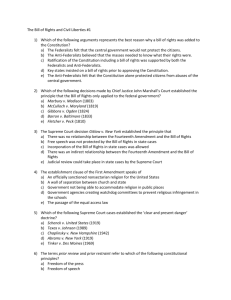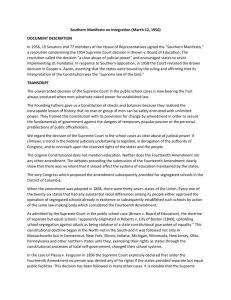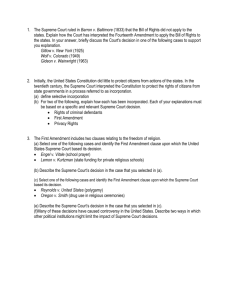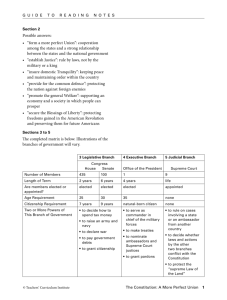Government by the Judiciary
advertisement
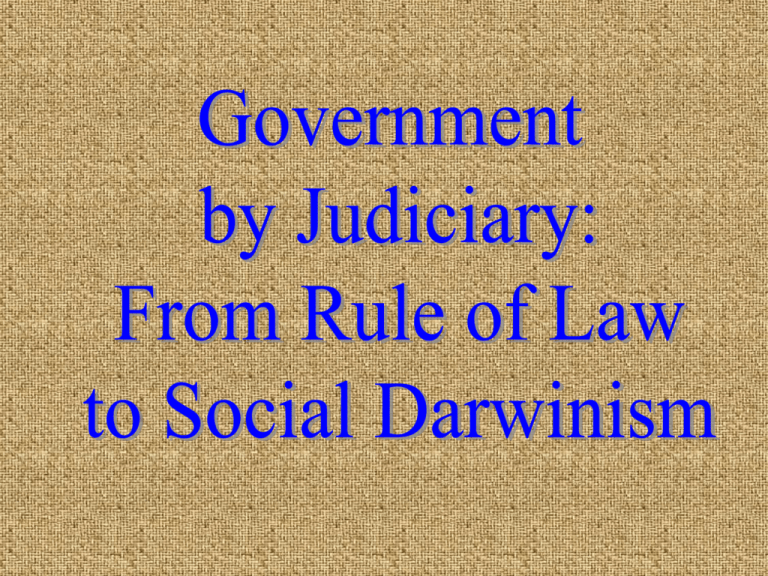
The judiciary is beyond comparison the weakest of the three departments of power. No. 78 “a Bench” Sir William Blackstone (1723-1780) “Man as a creature must necessarily be subject to the laws of his Creator. This will of his maker is called the law of nature. No human laws are of any validity if contrary to this.” Sir William Blackstone Cicero – 65 B.C. A legislative majority may pass laws that contradict the natural law, but “these no more deserve to be called laws than the rules a band of robbers might pass in their assembly.” News Flash: March 23, 2005 •President Bush answered a reporter on the question of the North American Union, saying: “As to what kind of union might there be, I see one based upon… commitment to…democracy [and] rule of law.” Rule of Law Because the United States is a constitutional republic, both the people and their elected leaders observe the limitations imposed by a written Constitution which is solidly founded on “the laws of Nature and of Natures God” Rule of Law Makers Rule of Law makers • “Because the United States is a democracy, the majority of the people decide how our government will be organized and run. The people do this by electing representatives, and these men and women then carry out the wishes of the people.” Department of Army Field Manual June 1952 TNA June 30, 1986 •How did we evolve from “rule of law” to the “rule of law makers”? Is that you, Grandma? “I see no reason for attributing to man a significance different in kind from that which belongs to a baboon or a grain of sand.” Justice Oliver Wendell Holmes Beware of smooth talk! Liberty Forum Spring 2005 “Constitutions are utterly worthless to restrain the tyranny of governments, unless it be understood that the people will, by force, compel the government to keep within the constitutional limits.” “Practically speaking, no government knows any limits to its power, except the endurance of the people.” Page 19 Reading from “The White Rose” • “…Why do you allow these men who are in power to rob you step by step, openly and in secret, of one domain of your rights after another…” Germany 1942 John Marshall Chief Justice of the United States Supreme Court 1801 to 1835 The Doctrine of Judicial Review Power assumed by Justice John Marshall in the 1803 case of Marbury v. Madison whereby the court could invalidate statutes of Congress based upon the courts viewpoint of “original understanding” of the Constitution True or False: “The Supreme Court has the final authority to interpret the meaning of the Constitution and determine if the law is being applied correctly and fairly.” Page 30, January 2006 The Fact of Legislative Supremacy Or in other words, the legislature has power over the executive and judicial branches. a. Congress controls the purse strings b. Congress has the power to create federal courts and hence the power to abolish them. c. Congress has the power to restrict appeals to the Supreme Court d. Congress can impeach rogue justices On Restricting Appeals to the Supreme Court • Article III, Section 2 “The Supreme Court shall have appellate Jurisdiction… with such Exceptions, and under such Regulations as the Congress shall make.” Pledge Protection Act of 2004: HR 2028 (passed 247-173) • “No court created by Act of Congress shall have jurisdiction, and the Supreme Court shall have no appellate jurisdiction, to hear or decide” cases pertaining to the Pledge of Allegiance. TNA October 18, 2004 p 44 The Tempting of America: page 300 • How should a judge go about finding the law? What does it mean to “be bound by oath to support this Constitution?” Page 174 1996 2003 “the Constitution is simply gone.” Lawrence v. Texas Where did the Constitution go? As Joseph Sobran put it in his excellent essay, “How Tyranny Came to America”: “The United States Constitution poses no serious threat to our form of government today.” ACLU founded 1920 • Roger Baldwin: – Socialist – Goals: destroy Christianity and capitalism – Four Communist on the founding board – Organizations in league with the ACLU: • People for the American Way • National Education Association TNA February 6, 2006 p31 Felix Frankfurter Co-founder of the American Civil Liberties Union 1920 Supreme Court Justice 1939-62 Ruth Bader Ginsberg 1993- • General Counsel of the ACLU from 19731980 • Served on Board of Directors Ruth Bader Ginsberg 1993- • Director of the Women’s Rights Project during the 1970s for the American Civil Liberties Union American Civil Liberties Union “The pure version of intellectual class leftishness…” Robert Bork, Slouching p. 97 Fourteenth Amendment 1. Designed to constitutionalize the civil rights act of 1866 Fourteenth Amendment 1. Designed to constitutionalize the civil rights act of 1866 2. Designed to shield blacks from violence and oppression, discriminatory laws and law enforcement Fourteenth Amendment 1. Designed to constitutionalize the civil rights act of 1866 2. Designed to shield blacks from violence and oppression, discriminatory laws and law enforcement 3. Designed to protect fundamental rights, NOT to provide political or social equality Fourteenth Amendment 1. Designed to constitutionalize the civil rights act of 1866 2. Designed to shield blacks from violence and oppression, discriminatory laws and law enforcement 3. Designed to protect fundamental rights, NOT to provide political or social equality 4. Blacks should be immune from obligations, duties, pains and penalties from which other citizens are immune Fourteenth Amendment The Warren Court “revised the Fourteenth Amendment to mean exactly the opposite of what its framers designed it to mean, namely to leave suffrage and segregation beyond federal control, to leave it with the States. Where control over internal, domestic matters resided from the beginning.” R. Berger p. 245 “…a hellish interpretation of the Fourteenth Amendment.” Roe v. Wade War on the Unborn 1973 Criminalizing abortion violates a women’s right to privacy as guaranteed in the “due process clause” of the 14th amendment American War Casualties War on the Unborn Each cross represents 25,000 babies murdered since abortion was legalized Judicial review out of control: Roe v. Wade is “an improvident and extravagant exercise of the power of judicial review.” Chief Justice William H. Rhenquist 1973 Justice Antonin Scalia “Nothing stands behind the Court’s assertion that governmental affirmation of the society’s belief in God is unconstitutional except the Court’s own say so, citing as support only the unsubstantiated say-so of earlier Courts going back no farther than the mid-20th century.” Stormer, page 116 “No person should be nominated or confirmed who does not display both a grasp of and devotion to the philosophy of original understanding.” The Tempting of America page 9 Understanding where we once were and how we have gotten to where we are today, can be used to bring America back to again being truly “One nation under God.” Know Your Liberty Series Next Months Class: • March 3, Salt Lake City County Commission Chambers, 7:00 pm # 1 • March 24, Layton City Hall, 7:00 pm # 3 • libertyandlearning.com calendar intermission For God, Family and the Republic Five crucial questions to be asked of all Supreme Court nominees: to honor the legacy and memory of William Rhenquist 1. Do basic human rights come only from government or are they rooted in something that transcends government? Five crucial questions to be asked of all Supreme Court nominees: 2. Is man’s inherent human nature fixed or does raw political power determine who is and is not a member of the human family? Five crucial questions to be asked of all Supreme Court nominees: 3. Is law merely the construct of jurists and lawmakers or is it based on first principles of morals and justice? Five crucial questions to be asked of all Supreme Court nominees: 4. Is the proper role of the judiciary to restrain/limit itself to interpreting law or does it possess de facto legislative powers? Five crucial questions to be asked of all Supreme Court nominees: 5. Should the judiciary share power equally with the other two branches of government (the legislative and the executive) or should its powers transcend them? The Doctrine of Interposition “Interposition is an official act on the part of a State government to question the constitutionality of a policy established by the central government.” Liberty Forum, Winter 2006, Page 9 The Doctrine of Interposition Interposition is not Secession – it is sound contract theory that requires both parties, the Federal and the State, to obey the terms of the contract.” W. Cleon Skousen • The Supreme Court “The courts were to interpret, not create the law.” “The American Supreme Court has largely obliterated the independent authority of state governments.” “The public is massively uninformed about both law and judges.” 1998


